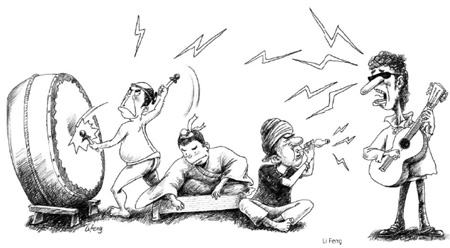-
-
China Daily E-paper
Madhav Nalapat
Adage of unity and division fits Asia
By M.D. Nalapat (China Daily)
Updated: 2010-02-26 07:48
 |
Large Medium Small |
Several Asian scholars claim to be experts in geopolitics: the science of tapping into the synergy among nations. But in reality the profession in Asia is slave to concepts designed elsewhere. As a result, the conclusions of Asian geopolitics experts often serve the interests of non-Asian powers.
The continent is home to the oldest civilizations and was once the world's knowledge and inventive powerhouse. Yet today it accounts for less than 9 percent of the major patents and discoveries in the world. Until five centuries ago, the continent accounted for three-fourths of the world's total output. Yet today it has more than half a billion people living in abject poverty.
There is much talk these days about the "Asian century", but the truth is Asian countries are yet to tap even a fraction of the synergy had they coordinated their policies that would have united them like European Union (EU) members.
| ||||
For example, West Asians have been taught to see themselves as separate from South Asians, and vice-versa, even though the two share several core cultural elements and have been trading and working with each other for thousands of years. Southeast Asia has been made to think it is a unique subset, far removed both from South Asia and East Asia. And Central Asia has been made to believe it is unique, when the fact is that it has had very close cultural ties with the whole of Asia.
Take the case of India and China. Thanks to years of conditioning by non-Asian scholars Chinese and Indians (like most Asian peoples) regard North Americans and Europeans closer than even their immediate neighbors. Ask educated Chinese or Indians about even a small country in Europe and chances are they will surprise you with the right answers. Ask them about their immediate neighbors and more likely than not you will draw a blank (except for popular but often baseless information).
This artificial segmentation of Asia into mutually exclusive zones is just the opposite of the unity of European countries at international forums. The reality is that Poland and Germany, for example, are culturally more different than South China and South India. Moreover, unlike the long history of uneasy relations between Germany and Poland or between Spain and the UK, India and China have only had a single conflict (in 1962) in more than 4,000 years of contacts. It's a testimony of non-Asian geopolitical scholarship that even Asian scholars and experts regard the unity among Europeans and division among Asians as a natural phenomenon.
So what do Asian countries need to break the Western intellectual shackles that restrain them from forging unity?
They should first form a "council of Asia", which will include every country on the continent as its member and hold summits at regular intervals to devise ways of strengthening Asian unity. Here it should be emphasized that Russia, too, should be invited to join the council because two-thirds of its territory is in Asia.
As a first step toward long-term cooperation, school curricula in every Asian country have to devote as many chapters to Asian nations as they do to countries in Europe and North America. Students should be encouraged to go to other Asian countries for higher studies, because intra-Asia relations are crucial for the success of the continent. Tourism and cultural links need to be developed through a phased relaxation of visa procedures and improved air services among Asian countries and the building of pan-Asian rail and road networks. Also, Asian countries should have joint ventures in film, theater, music and dance productions to showcase the diverse but rich culture and heritage of the other countries on the continent.
So why haven't Asian countries set up pan-continental institutions such as a monetary authority that would encourage intra-continental banking and other financial activities? Or why don't they have a pan-Asian network of disaster management centers to provide help to countries that struck by disaster? Or, for that matter, why don't they have a continental center for disease prevention and control? Blame the lack of effort to tap into the immense synergy within Asia for it. In fact, that's exactly the reason why Asia has been playing second fiddle to Europe and the US in innovation and technology development, even though it has a huge number of brilliant individuals in these fields.
Asia wants everlasting peace, and to achieve that all its countries have to commit themselves to resolving their pending disputes peacefully. It is extremely important that they, including those that have fought inwars or have been involved in conflicts, should agree to an "all-Asian no war pact". This, for all countries, would remove the threat of being attacked and give them all the time they need to implement their development programs.
Asia's current share in the creation of advanced knowledge is small in relation to that of Europe and America. But it can be increased through partnerships among Asian countries. Asian countries have to first look to their continental counterparts - just like EU countries - for solutions to their problems instead of venturing outside the continent to seek help.
Shanghai Cooperation Organization's member countries have made a healthy start by coordinating their responses to Afghanistan. That is important also because the failure of Asian statesmanship to understand the historical imperative of Asian unity has placed Afghanistan under the tutelage of countries far away from Asia. Ideally, Afghanistan should have been a free member of an Asian council, committed to fighting extremism and promoting progress.
Asia can rise fastest if it is united. We cannot afford to repeat the mistakes - the wars and conflicts - of the past. Nor can we travel the bloodstained road that Europe did till 1945 to achieve lasting peace. For many, unity among Asian countries may be "impossible". But unity is not only possible, but also imperative - only that Asia has to overcome its inferiority complex and think big.
The author is professor of geopolitics at Manipal University, India.

(China Daily 02/26/2010 page9)













